Yves here. The Brookings paper in question showed up in my inbox. Normally, when think tanks tell a howler, they do so through misleading framing or cherry picking data. This one, by contrast, had a speculation to information ratio that was off the charts.
By John Helmer, the longest continuously serving foreign correspondent in Russia, and the only western journalist to direct his own bureau independent of single national or commercial ties. Helmer has also been a professor of political science, and an advisor to government heads in Greece, the United States, and Asia. He is the first and only member of a US presidential administration (Jimmy Carter) to establish himself in Russia. Originally published at Dances with Bears
Clifford Gaddy (lead image, left) has never recovered from his 20-year infatuation with Anatoly Chubais and Alexei Kudrin. Neither has Gaddy’s boss at Brookings Institution in Washington, Strobe Talbott, the regime changer-in-chief at the State Department in the 1990s, when Boris Yeltsin was his man in the Kremlin, and the rest of the country too weak to resist.
If only they ruled Russia today, President Chubais, Prime Minister Kudrin or vice versa, instead of President Vladimir Putin, there could never ever be the Kremlin plot Gaddy and Brookings charged last week for blackmailing United States officials and their allies with something like the Panama Papers. A regime-changing plot like that isn’t as preposterous as it sounds — not because Putin thought of it, as Gaddy now claims, but because Gaddy and Talbott used it a good many times themselves in Moscow, and in Belgrade too, until Putin put a stop to them. For lossmaking Brookings, however, putting a stop to Putin’s plotting is a desperate advertisement for badly needed funds.
“Are the Russians actually behind the Panama Papers?” is the title of Gaddy’s indictment. It isn’t an opinion-page piece placed in a newspaper. There’s no institutional disclaimer either. It is an official publication of the Brookings think-tank where Gaddy is chief expert on Russia, and Talbott is chief executive.
Also, the question isn’t a genuine one, because Gaddy’s answer is yes. “My thinking”, he says, ignoring the subjunctives, conditionals, and the cyrillization of control (контроль) –“is this could have been a Russian intelligence operation, which orchestrated a high-profile leak and established total credibility by ‘implicating’ (not really implicating) Russia and keeping the source hidden. Some documents would be used for anti-corruption campaigns in a few countries—topple some minor regimes, destroy a few careers and fortunes. By then blackmailing the real targets in the United States and elsewhere (individuals not in the current leak), the Russian puppet masters get ‘kontrol’ and influence.”
Gaddy provides no evidence. Instead, he proposes the ancient Roman courtroom trick of casting blame in the direction of motive when the evidence of commission of acts is absent. “The cui bono [“to whose good”] principle connects profits with motives, asking who stands to gain from a certain action. If it’s the Russians who win, isn’t it possible that they are somehow behind at least part of this story?” — that’s another of Gaddy’s trick questions, to which he has the ready answer.
“So let’s say that the ‘who’ is the Russians, and the ‘why’ is to deflect attention and show that ‘everybody does it.’ But how? Given Russia’s vaunted hacking capabilities, a special cyber unit in the Kremlin may have been able to obtain the documents. (Monssack [sic] Fonseca is maintaining that the leak was not an inside job.) But it is most likely that such an operation would be run out of an agency called the Russian Financial Monitoring Service (RFM). RFM is Putin’s personal financial intelligence unit—he created it and it answers only to him. It is completely legitimate and is widely recognized as the most powerful such agency in the world, with a monopoly on information about money laundering, offshore centers, and related issues involving Russia or Russian nationals.”
RosFinMonitoring’s chief, Yury Chikhanchin, who has an economics doctorate like Gaddy and 16 years in the security services, first took charge of the agency in 2008. Four years later, in June 2012, Putin met him publicly, twice, to hand him the cover story, according to Gaddy, for what RFM really does that’s different from its US counterpart, the US Treasury’s Financial Crimes Enforcement Network (FinCEN), headed by Jennifer Shasky Calvery (right).
According to Putin, “we must prepare a national plan to combat money laundering, tax evasion, and offshore tax evaders, while understanding which company is the ultimate beneficiary of this. This is what other countries, or at least many of them, do.”
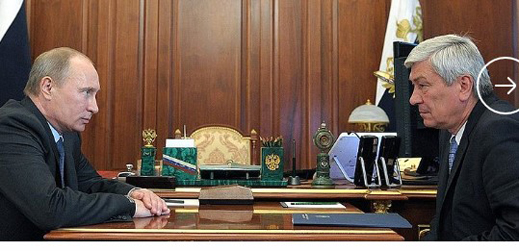
Putin and Chikhanchin, June 13, 2012. According to Brookings, Putin told Chikhanchin to break into Panamanian offshore company registration files to find the names of influential US government officials and businessmen in order to blackmail them into taking Kremlin orders.
Putin also told Chikhanchin to keep his work secret. “I note that over these years, despite the complexity and confidential nature of your work, the Service has never had any leak of information that could be damaging for our country’s business and economy. I hope that you will continue to work just as intensely, thoroughly and carefully.”
In July 2013 the RFM was exposed in public as Putin’s personal spy agency. That was in a publication financed by the Russian state media budget. The author of the disclosure was… Gaddy. One of the secrets Gaddy kept then, and now, is that between 2000 and 2002 Chikhanchin was head of the Currency Control Department at the Finance Ministry. The minister to whom he reported was… Kudrin.
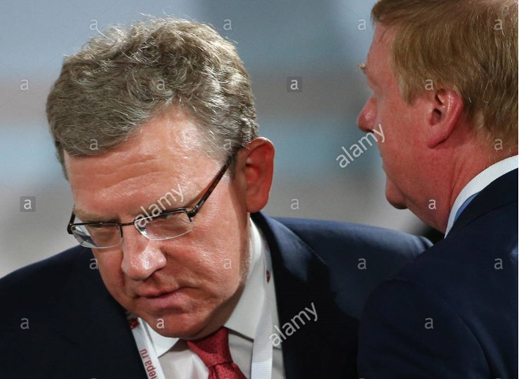
Kudrin (left) with Chubais, January 14, 2015
But the Putin-Chikhanchin secret is now out, leaked by Gaddy: “the purpose of the Panama Papers operation… is a message directed at the Americans and other Western political leaders who could be mentioned but are not. The message is: ‘We have information on your financial misdeeds, too. You know we do. We can keep them secret if you work with us.’ In other words, the individuals mentioned in the documents are not the targets. The ones who are not mentioned are the targets.”
When Cicero called out “cui bono”, the Romans in court didn’t know what a boomerang was. Without evidence, the Putin plot according to Gaddy is just that. He invites the question – what motive, benefit, or profit can he, Talbott, and Brookings have for attacking the Panama Papers as a Putin blackmail scheme? This isn’t a trick question.
According to Gaddy’s resume, in the mid-1990s he was “an advisor to the Russian finance ministry and regional governments on issues of fiscal federalism for the U.S. Government’s Tax Reform Oversight Project for Russia.” Talbott was Under-Secretary of State. The recent release of the transcripts of telephone-calls and meetings at the time between President Bill Clinton and British Prime Minister Tony Blair reveals that Talbott’s mandate was to keep Yeltsin in power if possible – and if impossible, build up as his replacement Yegor Gaidar at best, Victor Chernomyrdin at worst. Getting rid of Prime Minister Yevgeny Primakov was one of Talbott’s regime changes; at the same time as he was plotting the overthrow of Slobodan Milosevic in Serbia. For details, read this.
How are their interests now, and Brookings’ interests, affected by the Panama Papers? For cui bono, read cash. Brookings doesn’t fully reveal the identity and value of its funding sources. But this how it describes them: “Generous individuals, foundations, leading corporations, and U.S. and foreign government agencies that share our commitment to quality, independence, and impact in public policy research and analysis support Brookings with financial contributions and intellectual engagement. Donors invest in Brookings with both project-specific gifts and unrestricted funds that help us react nimbly to breaking events and confront urgent challenges, from the domestic and global economies to foreign affairs to the health of America’s cities and metropolitan areas.”
For quality, independence, and impact this is what Talbott and Gaddy define as Brookings’ current mission on Russia: “Confronting an aggressive Russia, U.S. policymakers must understand President Putin’s motivations and worldview in order to devise an effective strategy to counter Moscow’s revanchist agenda. Whether considering Putin’s efforts to re-establish a sphere of influence in Eastern Europe or his turn to nationalism to burnish his domestic popularity, Senior Fellows Fiona Hill and Clifford Gaddy offer U.S. policymakers comprehensive insights into the Russian leader. In 2015, Gaddy and Hill, director of the Center on the United States and Europe, released an expanded edition of Mr. Putin: Operative in the Kremlin, adding five new chapters that provide greater context on Putin’s ambitions for Russia.” Russia and China are defined by the think-tank as the principal “direct challengers to the liberal, international order.”
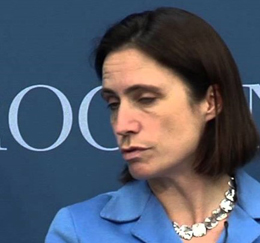 Fiona Hill (right), the alternate expert on Russia after Gaddy, was a UK national; a Harvard PhD, then an academic, and between 2006 and 2009 “the national intelligence officer for Russia and Eurasia at The National Intelligence Council.”
Fiona Hill (right), the alternate expert on Russia after Gaddy, was a UK national; a Harvard PhD, then an academic, and between 2006 and 2009 “the national intelligence officer for Russia and Eurasia at The National Intelligence Council.”
The second alternate expert on Russia on the Brookings payroll, titled “senior fellow in the Project on International Order and Strategy in the Foreign Policy program”, is Robert Kagan. He is the husband of Victoria Nuland, who is in charge of regime-change operations for Russia and Ukraine at the State Department at the moment. For details, click to read.
For the money in the pay packets of Talbott, Gaddy, Hill and Kagan, open page 39 of the 2015 annual report for the current list of Brookings paymasters. The foreign governments giving this cash include the US military allies, Australia (foreign ministry, defence ministry), Canada, UK, Japan, South Korea, Qatar, Turkey, United Arab Emirates (UAE), and Norway. To match these countries and governments to the list of names revealed in the Panama Papers, open this. Of the governments appearing on both the Brookings and Panama lists, either directly or through proxies, the most obvious are Qatar, Ukraine, UK, and UAE.
But their wars may be hurting Brookings’ bottom-line. The think-tank reports its revenue in 2015 fell from the year before by 11% to $95.6 million, while its operating costs jumped 5% to $104.2 million. Brookings’ investment income also suffered, dropping from a positive $38.9 million in 2014 to a negative $22 million in 2015. This means the think-tank is in the red operationally, and needs to raise more donor cash urgently.
BROOKINGS IS NOW LOSS-MAKING – THE 2015 BALANCE-SHEET
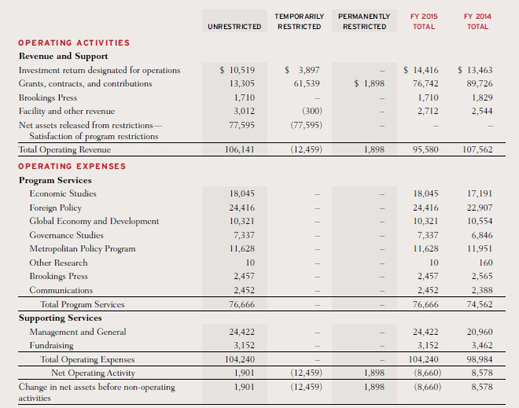
Source: http://www.brookings.edu/~/media/About/Content/annualreport/2015annualreport.pdf -- page 42.
The need for fresh money is particularly urgent for foreign policy, because Talbott, Gaddy, Hill, Pifer, and Kagan aren’t cheap: they consume one-third of the think-tank budget each year. Foreign enemies, not domestic American issues, are what brings home the bacon for Brookings.
Brookings’ committee for offshore money-raising is headed by Antoine van Agtmael, an American of Dutch origin. His business is emerging market investment funds; they appear to be based in the UK, and use Ireland for offshore registration; Russia has not been one of his investment targets. The Brookings board is heavy on Americans (3), Spaniards (3), Mexicans (2), Canadians (2), and Israelis (2).
BROOKINGS’ BIGGEST PAYMASTERS IN 2015
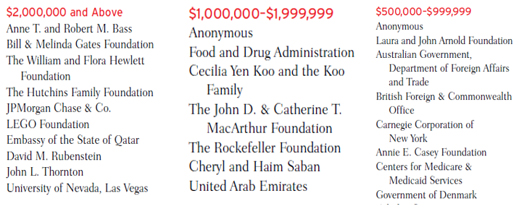
Source: Brookings Annual Report 2015 -- page 39
The Panama Papers list of names counts five Israeli oligarchs — Lev Leviev, Idnan Ofer, Teddy Sagi, Dan Gertler, and Beny Steinmetz. There are several Spaniards, including the Spanish duchess, Pilar de Borbon, sister of former King Juan Carlos.
There are no Russian donors to Brookings — only anti-Russian donors. The flushest of them is the Ukrainian oligarch, Victor Pinchuk. He has been providing $200,000 annually to the institution, and he takes a seat on its International Advisory Council. He funds the pro-Kiev, anti-Moscow Ukrainian coverage by former US Ambassador to Ukraine, Steven Pifer, a salaried Brookings Fellow. For more details, including Brookings’ and Pifer’s refusal to discuss the Pinchuk money, read this. The latest report from Brookings on where its money came from in 2015 identifies Pinchuk as continuing to give in the range of $100,000-$249,000.
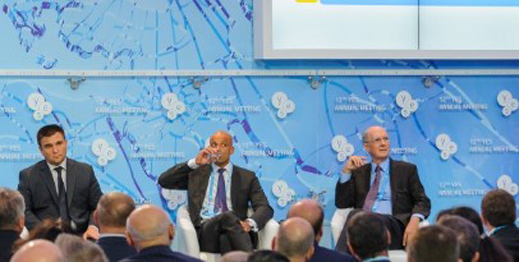
Talbott (right) was Pinchuk’s guest at the Yalta European Strategy (YES) meeting in Kiev on September 12, 2015. On the left, Ukrainian foreign minister Pavlo Klimkin; centre, James Appathurai, the Canadian spokesman for NATO. Pifer of Brookings has been a regular guest of Pinchuk’s at the annual YES convention for years.
Source: http://yes-ukraine.org/en/photo-and-video/photo/sammit-2015
Following the Brookings money trail identifies a cui bono motive for Brookings to protect its benefactors, local and foreign, by attacking the Panama Papers in case the money landing in the Brookings till has been laundered from benefactor crimes. The Russian charges that Pinchuk stole more than $200 million from his Rossiya Insurance Company in Moscow suggest something of the sort, though there have been no trials, no convictions. For details of that case, read this.
For the Talbott-Gaddy theory of Putin-Chikhanchik blackmail to turn into publishable evidence requires a naïve believer, a stooge — indeed, several of them, including the most rabidly anti-Russian media in the English-speaking world: the London Guardian, the Rupert Murdoch press, the Daily Beast (director, Chelsea Clinton), and the Nikkei-owned Financial Times (Nikkei gave more than $50,000 to Brookings last year). According to Gaddy’s version, the International Consortium of Investigative Journalists (ICIJ) of Washington, which has supervised the authentication and dissemination of the Panama Papers, is “the self-described elite of investigative journalists—but what have they discovered about the source of all these documents?”
Nichevo, says Gaddy. “Perhaps, since the ICIJ is funded by Americans, they’re not going to bite the hand that feeds them… Perhaps, then, someone purged those references before the documents were handed over to the German newspaper. The ‘someone’ would… be the Russians—and the absence of incriminating information about Americans is an important hint of what I think to be the real purpose of this leak.”
Brookings almost follows the money trail into the ICIJ, but stops short. Had it gone further, it would have discovered among the financiers of ICIJ and its Washington parent, the Center for Public Integrity (CPI), there are George Soros’s Open Society Foundations; many of the same American foundations to be found on the Brookings benefactor list; plus proprietors of the media which are publishing the Panama Papers. This cui bono trail runs around the world in a circle. For example, Soros pays money to the ICIJ to receive the Panama Papers, and pays the Mail& Guardian of South Africa to report them.
The US Agency for International Development (USAID) also pays into the circle by financing “fact checking”, “investigative journalism”, and “responsible media” projects in countries where the Panama Papers stories have been amplified, such as the Balkans, Ukraine, Mexico, and the Philippines.
On April 9, the State Department spokesman acknowledged that one of the funnels for the Panama Papers, the Organized Crime and Corruption Reporting Project (OCCRP), is financed by USAID. “They”, claimed spokesman Mark Toner (below) “ this organization conducts investigative journalism, primarily, I think, in Europe.”
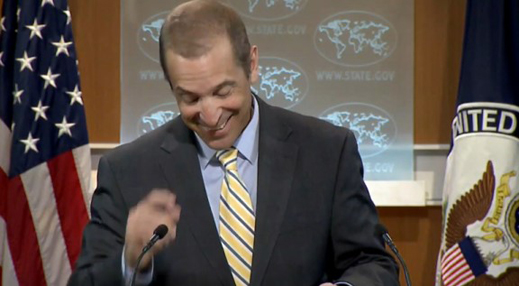
Source: http://video.state.gov/en/video/4836242546001
“Obviously, these are the kind of organizations that USAID has and continues to fund, but not specifically for – to go after any particular government, but – or any particular individual, but simply to conduct what – and what we’re supporting here is the conduct of independent investigative journalism that we believe can shine a light on corruption, because, as the Secretary on down have said, corruption continues to have a corrosive effect on good governance around the world. So it’s part of our – a core tenet of our foreign policy that we support organizations that go after corruption.”
Cui bono? asked reporters at the briefing. “We have no editorial control over what over their reporting,” Toner answered. “They’re allowed [by the US Government] to and permitted to cover whatever they want.”
The Brookings attack on the Panama Papers as a Russian plot appeared on April 7, two days before the State Department made these admissions.
The OCCRP reports the US Government and Soros money in the funding section of its website; it omits them both in its history of the organization. As for how accountable the ICIJ is to investigation of its own funds, it isn’t. This is what happened when the ICIJ’s director, Gerard Ryle, was asked questions about a Russian investigation he had just published with the Guardian in November 2012 – before Ryle cut the telephone line.


it really looks like the PP is an American plot where ICIJ have been told to keep anything that makes Americans look bad, secret, or else. I’m sure they would comply without question.
Once one learns to filter out the ‘nationalist’ bias in all this, and shift to a class based analysis, things become clearer. “Cui bono” indeed.
Despite all the mud being slung at him, Putin, as an old KGB apparatchik, comes across as an unqualified Russian patriot. That independent streak is what the Neos cannot stomach.
Why would the Russians release anything if they wanted to use this stuff for blackmail? Don’t they also want to blackmail foreigners?
Heh heh. I subscribed to Brookings’ newsletter in March – they are actually doing some marketing as there must be concern in Imperial circles that the teevee and the ny times are just not reaching enough pawns anymore. Helmer’s article confirms what is pretty obvious about Brookings if you read a few articles – it is a propaganda organ of Empire (or some major elements thereof). That’s not to say that it doesn’t get some stuff right – it is highly likely that the shadowy figures behind the Mossack Fonsecka data hack are using it for making money – blackmail such a dirty word but how about selectively releasing data based on who will pay the most to expose their enemies? SO just take bad evil Russia out of the mix and consider who the initial targets were and who would want them exposed and you can get a pretty good idea of who the paymasters are.
You’ve got to cast a wide net – there is so much disinformation floating around – but even the most obvious propaganda reveals more than the propagandist wants revealed. That’s why Russians used to read Pravda – the knew it was propaganda but they also knew it contained information for those with eyes to see.
Good old “cui bono” – is it similar to children’s ‘I know you are but what am I”, or a more sophisticated Monty Python exercise in logic?
Those who own the hidden money, some of the shady ‘winners’ of our societies have been exposed. Perhaps other humans who are suffering from governmental poverty will benefit from the potential windfall.
Wait, wait; if the hungry or the homeless or ill benefit that must mean that they are the ones to whom the “bono” falls. How dare such perpetrators of need behave so criminally as to hide money and then criminally exposed proprietorial information? Let the rich keep the money and the rest of us receive a well-deserved nothing of their ill-gotten gains.
Good to see Arnold foundation listed. xEnron Hedge Fund Billionaire is now messing in state pensions everywhere, encouraging secret PE and HF while cutting benefits to workers.
So, what of Unaoil and that leak/scandal? What is known of the pedigree of its sources and publishers? I cast no aspersion, just asking the question (at this point).
I thought the timing of the Mossack Fonseca story was possibly convenient, coming out within a few days after the Unaoil story, and effectively eclipsing it. One would think a journalist (at least one?) would put one and one together and associate (or seek to cross-reference) these two stories, but that has not happened yet.
Brookings has become shockingly slanted on international affairs over the last decade or so.
http://www.cnbc.com/2016/04/12/swiss-banker-whistleblower-cia-behind-panama-papers.html.
Birkenfeld, major banking whistleblower, late of UBS, believes that the Panama Papers leak originates with the CIA & NSA. Given that the targets thus far revealed are nations with a vexed relationship with the US, this seems plausible.
Short article, not dispositive, yet considering the interviewee, difficult to discount out of hand, no?
Despite being at a Swiss bank, Birkenfeld appears to have had no or few dealings with the world of Mossack Fonseca. He knew that his customers were American. That’s how he was able to blow the whistle on the bank.
The whole point of using a firm like Mossack Fonseca is to set up a structure so that the ultimate owners can’t be found. Birkenfeld would have had no idea where his customers were if he was dealing with registered agents like Mossack Fonseca.
Our Richard Smith knows way more about this than Bireknfeld. He’s being called by the UK media heavily. He think Birkenfeld is all wet.
And the leak has hurt one of the US’s pet project, our pet government in Ukraine The CIA can’t have wanted that. See Economist: The Mossack Fonseca leak shakes Ukraine more than Russia
I think it’s an interesting theory, but a theory it remains. Why would the leaker pick a random (to an American observer) German paper?
I put up a simplistic argument about the propoganda, misdirection and defocussing around the papers on OpEd News – trying to get people to stay focussed on the fight against plutocracy and what can be gained. I pointed that the alphabetsoupers are doing a really poor job.
I got trolled, had accusations heaped on my head and was dismayed to see that people cannot even sit down and read the websites. People are just falling for every type of clickbait headline.
We can speculate all like about the leaker; the truth is WE DON’T KNOW. At least I got a handle on how it was done with my friend: http://www.unicornriot.ninja/?p=5357 so to say this was done as a robbery is pure bunk. The breech is still open and servers have been seized by El Salvador. Who’s gonna check them for the hands that took out information?
This entire zeitgeist opens up all sorts of opportunities for spin, manipulation, outright lies, deluded accusations.
The REAL question is will anything at all be done about tax evasion, money laundering, hidden criminal activities, and shell corporations doing anything from assisting terrorism, acquiring nuclear materials, continuing sex trafficking/slavery, organ harvesting and all the other “activities” they facilitate. Whole countries are being bankrupted by the SHELL GAME. Rob Kall says my “take” is essentially the same as John Perkins and an interview with him will be running soon.
The biggest howler in the mess is the idea of DodgyDave running his transparency conference in May!
https://www.facebook.com/ajplusenglish/videos/715351548606355/?pnref=story
We should really stop calling these places “think tanks” and use the term “Ministries Of Truths” instead.
The Brookings Ministry of Truth, etc…etc…etc…
Maybe Trump or someone will build a “Cone of Silence” around them??
Of course we know ‘ who benefits ‘ ; the neoliberal consensus in its myriad forms . How ? I offer three examples :
1. Make the little people everywhere believe that the big fish are going to be caught .
2. Keep plugging the ‘ Putin is Evil ‘ meme.
3. Create a climate of fear among the really dodgy money owners as a first strike before offering them an accommodation within the properly laundered club.
I am sure there are others, but these stood out to me as soon as the story broke.
Geez Helmer does good old-fashioned investigative journalism.
My “three day” prediction on Panama Papers was pretty accurate, pretty much gone after the initial frisson.There’s probably some superset of money hiding companies that are trying to scare clients out of Mossack and into their arms. What will be done? Zero, maybe a few perps walks for low level lawyers.
Seeing BillG’s name on Brookings confirms the obvious: he’s just another corporo-fascist, he backs stuff like The Better Than Cash Alliance whose sole aim is to get the world’s citizens hooked on credit card debt. So Mr. Super-Rich Goofy IT Guy shows his true colors, kinda like Sergey Brin at Google and his efforts to overthrow Assad.
Yep, it is a Russian plot. In addition the Russians funded the panama law firm, encouraged all these ex-British colonies to become tax havens, and blackmailed all these wealthy, important people in the West to sacrifice their hard earned income to fund these tax havens in an huge sacrifice.
Amazing 60 year Russian plot, and a well kept secret, no western intelligence service got so much as as a hint of this dastardly Russian scheme.
It is just brilliant for this clear thinker of the Brookings institute to unmask this plot without a shrew of evidence, just brilliant.
One has to be in awe of the outstanding management and total genius of the staff of such a prestigious think tank. Their speculations and inferences are worth their weight in gold, and we hang on their every word, and wait for every utterance